#Atlantic Foundation
Explore tagged Tumblr posts
Text
Expert Helical Piers Installation Services in North Carolina: Ensuring Foundation Stability
Foundation issues are among the most significant concerns for homeowners in North Carolina, especially in areas where soil conditions can lead to settling or shifting foundations. When foundation problems arise, one of the most effective and reliable solutions is helical pier installation. This advanced method provides lasting foundation support and can prevent further structural damage. At Atlantic Foundation, we offer professional helical pier installation services throughout North Carolina, helping homeowners safeguard their property’s foundation and maintain its stability.
What Are Helical Piers?
Helical piers, also known as screw piles, are a type of deep foundation support system. They are steel shafts with helical plates (or "screws") attached to the ends. These piers are drilled deep into the ground to support the weight of the structure, transferring the load to stable soil or bedrock far below the surface. This method of foundation repair is especially useful for homes and buildings with settling foundations, uneven floors, or structural distress.
Helical piers are ideal for various applications, including:
Foundation repair: Addressing issues such as settling or shifting foundations caused by poor soil conditions, moisture changes, or aging infrastructure.
New construction: Providing stable and secure foundations for new structures, especially in areas with unstable or unpredictable soil conditions.
Lifting and leveling foundations: Correcting settled or sinking foundations by lifting and stabilizing the structure.
Why Choose Helical Piers for Foundation Repair?
Helical piers offer several advantages over traditional foundation repair methods. Here are some reasons why they are the preferred choice for homeowners in North Carolina:
Quick and Efficient Installation: Unlike other foundation repair methods, helical piers can be installed quickly. The process is less invasive, and the installation time is much shorter, which minimizes disruption to your daily life.
Minimal Landscaping Disruption: Since helical piers are installed using a specialized drilling machine, there’s less disturbance to the surrounding landscape. This makes the installation process cleaner and more efficient, reducing the need for extensive excavation or landscaping repairs.
Versatility: Helical piers can be installed in almost any soil condition, whether it's clay, sand, or rocky terrain. This versatility makes them ideal for North Carolina's varied soil types, which can often cause foundation movement.
Cost-Effective: In comparison to traditional concrete slab lifting or full foundation replacement, helical piers are generally more affordable. Their quick installation process and minimal disruption reduce overall costs.
Long-Term Durability: Made from corrosion-resistant steel, helical piers are designed to last for many years. Once installed, they continue to provide reliable support, ensuring that your foundation remains stable and secure over time.
Non-Destructive: Unlike traditional foundation repair methods, helical piers do not involve the removal of significant portions of your home’s foundation or structure. This reduces the potential for additional damage to the building during the repair process.
Adjustability: Should future adjustments be needed, helical piers can be easily modified, making them a flexible solution for long-term foundation stability.
The Process of Helical Pier Installation
When you hire Atlantic Foundation for helical pier installation in North Carolina, we follow a systematic approach to ensure the repair is done correctly and efficiently. Here is an overview of the typical process:
1. Free Site Inspection and Assessment
Our process begins with a thorough inspection of your property. A foundation expert will evaluate the condition of your foundation, identify the cause of the issues (such as soil movement or moisture problems), and determine if helical piers are the best solution. We’ll explain our findings and provide a detailed report and estimate for the work.
2. Planning and Design
Once the assessment is complete, we will design a custom plan for your specific needs. Our team will decide on the number of piers required, their placement, and the depth they need to reach to ensure stable foundation support.
3. Installation
Using specialized equipment, we will begin installing the helical piers into the ground. The piers are "screwed" into the earth until they reach stable soil or bedrock. Our installation process is precise and ensures that each pier is installed at the right depth to provide adequate support for your foundation.
4. Foundation Stabilization and Leveling
Once the piers are installed, we will carefully lift and level your foundation, correcting any unevenness or settling. The helical piers will provide the necessary support, lifting the foundation back to its original level, stabilizing the structure, and preventing future movement.

5. Final Inspection and Quality Assurance
After installation, we perform a final inspection to ensure the piers are correctly installed and that your foundation is properly supported. We will also check for any additional signs of damage or movement to ensure that the issue has been fully addressed.
6. Post-Installation Support
We offer warranties on our helical piers, ensuring that you have long-term peace of mind knowing that your foundation is secure. In the rare event that adjustments or further repairs are needed, our team will be available to provide additional support.
Benefits of Choosing Atlantic Foundation for Your Helical Pier Installation
As a leading provider of foundation repair services in North Carolina, Atlantic Foundation stands out for our commitment to quality, customer satisfaction, and long-term solutions. Here’s why you should choose us for your helical pier installation needs:
Experienced Professionals: Our team has years of experience in foundation repair, and we specialize in helical pier installation. We are fully licensed and trained to handle all types of foundation issues, ensuring the job is done right the first time.
Advanced Equipment: We use the latest technology and equipment to perform precise helical pier installations. Our advanced machinery allows us to install the piers quickly and efficiently, even in difficult or limited access areas.
Custom Solutions: Every home and foundation issue is different, which is why we provide tailored solutions based on your specific needs. We assess your foundation and recommend the most effective repair plan to ensure lasting results.
Affordable, Transparent Pricing: We offer competitive pricing for our helical pier installation services, and we ensure that all costs are clearly explained upfront. We believe in transparency and will never surprise you with hidden fees.
Long-Term Results: Our goal is to provide permanent solutions to your foundation problems. We use high-quality materials and proven techniques to ensure that your foundation remains stable for years to come.
Customer Satisfaction: We take pride in our work and strive to ensure that every customer is completely satisfied with the services we provide. Our team works efficiently, professionally, and courteously to minimize disruption to your daily life.
Conclusion
If you’re experiencing foundation issues in North Carolina, helical pier installation may be the ideal solution. At Atlantic Foundation, we specialize in providing reliable, cost-effective, and long-lasting foundation repairs using helical piers. Whether your foundation is settling, shifting, or experiencing structural damage, our team has the experience and tools necessary to restore your home’s stability.
Don’t wait until small foundation problems turn into costly repairs. Contact Atlantic Foundation today for a free site inspection and learn how our helical pier installation services can safeguard your home’s foundation.
#atlanticfoundation#basement wall repair contractors#foundationrepair#atlantic foundation#foundation repair services
0 notes
Text
Pelican Eel
Filmed by Rebikoff Foundation
The crew of the LULA1000 manned submersible managed to record a first-ever video of a hunting pelican eel or gulper eel in 2018. The observation was made 1000 meters deep south of the island of São Jorge, in the Azores. This is the first time the pelican eel has been observed directly by humans.
#reddit#unbelieveablestuff#crazyguyfromthebeach#submersible#pelican eel#rebikoff foundation#lula1000#hunting#gulper eel#azores#first direct human observation#2018#2010s#marine biology#animal#fauna#eel#submarine#sao jorge#atlantic ocean#north atlantic ocean
44 notes
·
View notes
Text

Got my first Foundation MTF grunt painted, four more to go, plus command staff (who I also need to pick minis for)
4 notes
·
View notes
Text
It takes an hour to drive from Tórshavn all the way up north to Hvannasund, a fishing village of 248 people. Marshfield and Østrem won’t tell me if someone tipped them off, or if there’s another way they heard about the hunt. But they do share their plan: to document everything, even if it means breaking the law by flying a drone over the site of the hunt.
The roads are drilled straight through mountains to save the trouble of climbing up or around, and each time we exit a tunnel, I catch my breath. Waterfalls flush down emerald hills, dotted with small sheds for sheep, and tumble into glittering fjords. Marshfield talks about how nervous he is. It’s his first grind; he’s unsure how he’ll handle the blood.
Østrem has more experience with it. He was here for a couple of months in 2022 after several years of volunteering with other animal rights organizations in Oslo, Norway. He’s horrified by the way people treat animals around the world, including at fish farms in Norway. To him, the grind is just one example of the way humanity abuses other beings.
Marshfield is similarly resolute. He got involved with Sea Shepherd about eight years ago, after seeing an online photo of a slaughtered whale that left him deeply upset. His activism gradually scaled up; he started by donating, then sharing things on Facebook and selling T-shirts. Eventually, he joined Sea Shepherd campaigns in Sicily and Iceland. Now, he’s here. He grows more solemn as we drive, steeling himself to see a dead whale in person.
Watson’s followers have a long history of fighting the grind. Activist groups, including Sea Shepherd, first started protesting the tradition back in the 1980s, putting the archipelago under global scrutiny. “People were telling us it didn’t look nice,” says Bjarni Mikkelsen, marine mammal specialist at the Faroe Marine Research Institute.
According to Mikkelsen, environmentalists grew troubled over whether the hunt was hurting pilot whale populations. “People walked around with banners, saying it was unsustainable,” he says. Around the same time, sighting surveys were launched to estimate population levels. The North Atlantic Marine Mammal Commission, a body comprising the Faroe Islands, Greenland, Iceland, and Norway, has since carried them out every six years.
Using standard international sampling techniques, surveyors most recently estimated the population of pilot whales in the Faroes–Iceland area to be around 380,000. Survey to survey, this number changes, depending on timing and coverage. But scientists consistently report abundances that can sustain the Faroese catch. “The population is high compared to other species in the North Atlantic,” Mikkelsen says, and there’s no significant downward trend.
Greenpeace eventually abandoned their opposition. But Sea Shepherd held firm. In 2014, under Watson’s leadership, around 70 volunteers descended on the islands for Operation GrindStop, donning black hoodies stamped with Sea Shepherd’s distinctive Jolly Roger insignia and physically intervening in hunts by jumping into the bay. The following year, the organization returned with the same conduct, resulting in fines, arrests, and court cases.
Resentment for the disturbances lingers among many of the Faroese, especially since Sea Shepherd Global continues to fight the hunt, though in softer ways. “Sea Shepherd’s history with the Faroe Islands has been quite aggressive and colorful,” says Valentina Crast, the group’s current Stop the Grind campaign coordinator. Now, she’s working on a tamer strategy, focused on building a local community of supporters.
Watson’s new foundation, meanwhile, wants to maintain the same level of pressure Sea Shepherd once brought. “We’re living in a world where there is no enforcement of international conservation laws,” Watson says. “The high seas are the Wild West. And we’re sort of vigilantes.”
The 73-year-old self-proclaimed pirate (a title confirmed by a United States Court of Appeals in 2013) is against the killing of whales on moral grounds, no matter who does it, or how. He has carried out his brand of vigilantism for nearly 50 years. Talking to him is like talking to a buccaneer who shares stories of sirens and sword fights, except Watson’s tales consist of ramming Portuguese whaling vessels, sinking Icelandic ships, and tricking Soviet soldiers. He’s been criticized for targeting Indigenous peoples over their traditional subsistence hunting practices, including seal hunters in Canada and teenage whalers in Alaska.
After the crackdown by the Faroese government, protests quelled for a while. But in recent years, social media and an increase in tourism have put the grind back in the spotlight. The Faroe Islands now receive about 100,000 visitors a year, and the nation is often included on top destination lists for its dramatic landscapes. During the summer when seabirds breed, bird lovers flock to spot puffins, guillemots, and other species that nest by the thousands on the steep cliffs. Hilton opened a hotel here in 2020, and the local airline is testing out a weekly direct route from New York. Unaware tourists might encounter a whale hunt occurring in the harbor, as those on a docked cruise ship did last summer; in that instance, most were not happy about the spectacle. Such stories, along with rather gruesome photos of the hunt itself, can be shared worldwide. The Captain Paul Watson Foundation seeks to capitalize on this.
Seizing its moment after splitting from Sea Shepherd, the Captain Paul Watson Foundation sent its first vessel—the John Paul DeJoria, registered in Jamaica and named after the cofounder of John Paul Mitchell Systems hair products—to the Faroe Islands in July 2023 to stop the whale hunts. But the Faroese government barred the ship’s entry to the archipelago via executive order. Ultimately, Watson made only two brief, albeit dramatic appearances, entering the nation’s waters once in an unsuccessful attempt to reach a grind and again 10 days later at news that someone had spotted a pod.
After the second breach, Jamaica stripped the ship’s registration at the request of the Faroese government, and the John Paul DeJoria was ported in the United Kingdom. Land crew, including Marshfield and Østrem, remained in Tórshavn to document what they could.
#current events#environmentalism#ecology#animals#marine life#hunting#whaling#food and drink#operation grindstop#denmark#faroe islands#iceland#streymoy#viðoy#tórshavn#hvannasund#bjarni mikkelsen#john paul watson#valentina crast#sea shepherd#faroe marine research institute#north atlantic marine mammal commission#captain paul watson foundation#dolphins#pilot whale#long-finned pilot whale
2 notes
·
View notes
Text
I remember when they started educating us about oysters and their importance to the bay! They would set up booths at festivals in Baltimore with aquariums full of oysters. It was very cool - I don't remember the year they started but 2014 seems about right.
Maryland has been working with other states on conservation efforts. We have made steps towards protecting the Chesapeake Bay, which is the largest estuary in the United States. The hard work seems to be paying off!
#baltimore#maryland#charm city#the baltimore you don't know#the baltimore you dont know#inner harbor#national aquarium#Chesapeake#chesapeake bay#chesapeake bay foundation#mid atlantic#estuary#wetlands#marshes#brackish#ecology#oysters#fishing#seafood
2 notes
·
View notes
Text






93: Convenience Store Woman [2016]
by: Sayaka Murata
#Books#Books I’ve Recently Read#Convenience Store Woman#Sayaka Murata#Keiko Furukura#Library#Library Books#Bookclub#Translated by: Ginny Tapley Takemori#Konbini ningen#Bungeishunju Ltd.#Tokyo#Japan#Grove Press#Grove Atlantic Inc.#New York#USA#Japan Foundation#Publishers Group West#Convenience Store
1 note
·
View note
Note
🎶 when you get this, put 5 songs you actually listen to, then publish. Send this ask to 10 of your followers (positivity is cool) 🎶
The Foundations Of Decay A Favor House Atlantic Kodokushi The Suffering
#coheed and cambria#aesop rock#my chemical romance#the foundations of decay#a favor house atlantic#the suffering#spirit world field guide
1 note
·
View note
Text
Ukraine — Another Lost United States/NATO(North Atlantic Terrorist Organization) War With No Regrets
— By Jan Oberg | December 16, 2023

Illustration: Chen Xian/Global Times
One of the enigmatic aspects of international politics is that big and militarily superior countries have systematically lost wars in smaller countries over the last 50 years, from Vietnam to Ukraine. "Losing" here means military defeat, being forced out, losing the struggle for the hearts and minds of the people, and facing fiasco when it comes to achieving the professed noble motives like introducing human rights, democracy, freedom or liberating women. And given the tremendous human costs, particularly in the Middle East, the US' "Global War on Terror" since September 11, 2001 is also an intellectual and moral disaster.
The US - by far the world's largest military spender, interventionist, warrior, occupier, global base-builder with the most militarized foreign policy - is in a class of its own. In losing wars too.
It is now rapidly losing legitimacy, relevance and credibility in the eyes of most of the world outside US/NATO/EU/ANPO/AUKUS. Firstly, all these imperial militarist adventures have been woefully anti-intellectual and imbued with the arrogance of power, elements of racism and hubris. Secondly, after quite predictable fiascos and defeats - such as in Iraq - there comes a time when propaganda, psychological operations (PSYOPS), media influencing, and psycho-political projection no longer do the trick.
There comes a time, too, when even the biggest military spender and economy cannot finance its weapons addiction and its arsenals of weapons and ammunition dry up.
It's called over-extension and diminishing legitimacy in the eyes of others, it's called militarism to death and is transforming into imperial decline and eventual fall. No empires have lasted forever and that of the US/NATO world will be the last. No one is so foolish to believe that, in an incredibly diverse world, everybody else would accept one player to be the all-dominating system and shape others into its own image. Missionary times are a thing of the past.
Enter Ukraine. NATO set itself up in Kiev immediately after it became independent and declared in 2008 that it would become a member of the alliance. It was a gross violation of the promises indisputably given to the last Soviet President, Michael Gorbachev, but such was the unipolar we-can-do-whatever-we-want sentiment.
In an autistic manner, NATO refused to listen to Russia's legitimate security concerns and also did not bother about the fact that there was only a tiny minority among the Ukrainian people in favour of membership of NATO. Instead, a regime change in Kiev was all that was needed: installing a pro-Western leadership, paying it well and giving it an offer it could not refuse by wooing it step-by-step into the ever-expanding alliance.
Russia then put its foot down, and insult had to be added to injury: We will help you, Ukraine, for as long as it takes for you to win "our" war against Russia and "weaken" it; you'll be covered the whole way, just fight for us to the last Ukrainian.
Thus, Part One with the expansion and wooing, and Part Two with the militarization and proxy war - but no membership of NATO, which would commit NATO troops to Ukrainian soil and cost NATO lives. Now comes Part Three - the abandonment and Ukraine on desolation row to be fixed by a faltering EU.
Here, the Palestine-Israel conflict comes in handy. The political and media attention on Ukraine has diminished significantly, while Ukraine's counter-offensive has stalled, and internal conflicts in Kiev accelerate.
The NATO blame game is on: We gave you all the weapons, ammunition and training we could, but you did not manage the military struggle well; your leadership is falling apart, and you are not as grateful to us as we had expected, and so on. And do not expect NATO or EU membership in the near future (no matter what we say for the public).
Obviously, nobody wants to be associated with such a political, economic, military, legal and moral fiasco. Not the US and NATO's leaders, who, from a historical perspective, provoked it in Part One and, instead of admitting it, continued to Part Two and Three.
The EU has not been able to develop its own policies on the Ukraine conflict. It followed the US blindly, installed history's toughest sanctions and completely isolated the largest European state, Russia, from Europe. Sweden and Finland willingly let themselves be pushed into NATO for no serious reason. Then followed the destruction of the Nord Stream pipelines, the largest ever infrastructure destruction (most likely carried out by the US because President Biden and other leaders said they would do just that and because of the silence and lack of official reports explaining who did what).
Weapons depots are becoming emptied, and now, to put it crudely, the Union looks increasingly wobbly politically while undergoing its deepest ever economic crisis. Germany's economic and political situation looks bleak. The EU area is likely to also be heavily hit by the long-term repercussions of the violence in the Middle East.
The EU's helter-skelter knee-jerk reaction to Russia's military operations in Ukraine prevented any analyses of likely consequences in the short-, mid- and long-term of these measures, which were as ill-considered and irrational as they were drastic. Russia, on the other hand, will get out of this quagmire much better than the EU.
While the US is comparatively well protected from the negative consequences of its policies, its European allies are not. The burdens on the civilian economy caused by warfare, militarism, tremendous re-armament, and refugee flows - and thereby, depletion of resources urgently needed for European infrastructure, climate change measures and welfare investments - paint a dark picture of the future.
It will likely become a guns-before-butter society, and future generations will have to pay the bills.
As time goes by, people will take to the street - for themselves and/or in support of, say, the Palestinians. Simultaneously, the far right will see its dawn as the economic crisis deepens.

— Thee Author, Jan Oberg, is Director of the Sweden-based Think Tank Transnational Foundation for Peace & Future
#Global Time | China 🇨🇳#United States 🇺🇸 | North Atlantic Terrorist Organization (NATO)#Ukraine 🇺🇦 — Russia 🇷🇺 War#Jan Oberg | Director | Swedish 🇸🇪 Think Tank Transnational Foundation For Peace & Future
0 notes
Text
Comprehensive Crawl Space Repair Services in North Carolina: Safeguard Your Home with Expert Solutions
Crawl spaces are often overlooked when it comes to home maintenance, but their condition plays a vital role in the overall health of your house. A damaged or poorly maintained crawl space can lead to numerous issues, from structural instability to health concerns caused by moisture and mold. In North Carolina, where humidity and seasonal changes can take a toll on your home, professional crawl space repair services are essential to maintain your home’s safety and longevity. Atlantic Foundation & Crawl Space Repair, serving areas across Raleigh-Durham and Eastern North Carolina, offers expert solutions for crawl space encapsulation, drainage systems, and foundation repairs.

Why Crawl Space Repair is Important
Your crawl space is the foundation of your home, and neglecting it can lead to significant problems. Without proper care, crawl spaces can harbor excess moisture, pests, and even mold, which can negatively impact your home’s structure and indoor air quality. Here are some common problems that arise from an unmaintained crawl space:
Excess Moisture: High humidity levels lead to mold, mildew, and wood rot. This can weaken the structural integrity of your home.
Pests and Rodents: Crawl spaces provide the perfect environment for pests like termites, rats, and ants.
Air Quality Issues: Mold and mildew spores can travel into your living spaces, affecting air quality and potentially causing health problems.
Structural Damage: Moisture can seep into wooden beams and other structural elements, causing them to weaken and deteriorate.
By investing in professional crawl space repair, you’re not only protecting your home from these issues but also increasing its resale value and overall comfort.
Our Crawl Space Repair Services
At Atlantic Foundation & Crawl Space Repair, we offer comprehensive services to address all types of crawl space problems. Our experts specialize in a range of solutions designed to protect your home from water damage, improve air quality, and ensure the long-term stability of your foundation.
1. Crawl Space Encapsulation
Encapsulation is one of the most effective methods for controlling moisture in your crawl space. This process involves sealing off the crawl space with a durable, vapor-resistant barrier. The encapsulation system prevents moisture from entering and helps control humidity levels, keeping your crawl space dry. Additionally, this barrier can also improve your home’s energy efficiency by reducing the amount of conditioned air that escapes into the crawl space.
2. Crawl Space Drainage Solutions
Excess water in your crawl space can lead to a range of issues, including mold, wood rot, and foundation damage. Installing a proper drainage system is essential to prevent water accumulation. Our team at Atlantic Foundation & Crawl Space Repair installs high-quality French drains and sump pumps to efficiently channel water away from your crawl space, keeping it dry and safe.
3. Moisture Control
In addition to encapsulation and drainage solutions, we provide moisture control services to address issues like high humidity and condensation in your crawl space. Our solutions include the installation of dehumidifiers and proper ventilation systems to keep your crawl space dry and free from moisture buildup.
4. Foundation Repair
A healthy foundation is crucial to the structural integrity of your home. If your crawl space shows signs of foundation damage such as cracks in the walls, uneven floors, or doors and windows that won’t close properly, it’s time for a foundation inspection. Our team offers foundation repair services to address shifting, settling, or cracking foundations. We use advanced techniques such as piering and leveling to stabilize your home’s foundation and restore its strength.
5. Structural Repairs
Over time, your crawl space and foundation may require structural repairs. These repairs ensure that the beams, joists, and other critical components of your home are secure and stable. Our experts will inspect your crawl space for any signs of structural damage and provide the necessary repairs to prevent further deterioration.
Why Choose Atlantic Foundation & Crawl Space Repair?
At Atlantic Foundation & Crawl Space Repair, we are dedicated to providing top-notch service to homeowners throughout North Carolina. Our team is highly trained and experienced, using the latest technology and techniques to ensure that your crawl space is properly repaired and maintained. Here’s why homeowners trust us with their crawl space needs:
Expert Technicians: Our team has extensive knowledge of crawl space repair and foundation stabilization, ensuring that your home is in good hands.
Comprehensive Solutions: We offer a range of services, from encapsulation to foundation repair, addressing every aspect of your crawl space’s health.
Free Evaluations: We provide free, no-obligation evaluations of your crawl space to assess the extent of the damage and recommend the best course of action.
Long-Term Solutions: Our repairs and encapsulation services are designed to last, ensuring that your home remains protected for years to come.
Protect Your Home with Professional Crawl Space Repair
Neglecting your crawl space can lead to costly damage and long-term problems. Fortunately, Atlantic Foundation & Crawl Space Repair is here to help. Whether you need encapsulation, drainage solutions, or foundation repairs, our team has the expertise to keep your home safe and sound. Serving Raleigh-Durham, Chapel Hill, Durham, and surrounding areas, we are your trusted partner for all things crawl space-related in North Carolina.
Contact Us Today
If you’re concerned about the condition of your crawl space, don’t wait for the problem to worsen. Reach out to Atlantic Foundation & Crawl Space Repair for a free evaluation and take the first step toward safeguarding your home. Call us at 919-855-0855 or visit our website to schedule your appointment.
#atlantic foundation#homemaintenance#foundation repair services#crawl space repair services#homeimprovement
0 notes
Photo


Settler’s Rest, 2022-2023.
Variable dimensions
Umbhaco and sea salt
More from my residency at Nirox Sculpture Park; got to play in the beautiful studio space by reinterpreting an ongoing work.
1 note
·
View note
Text
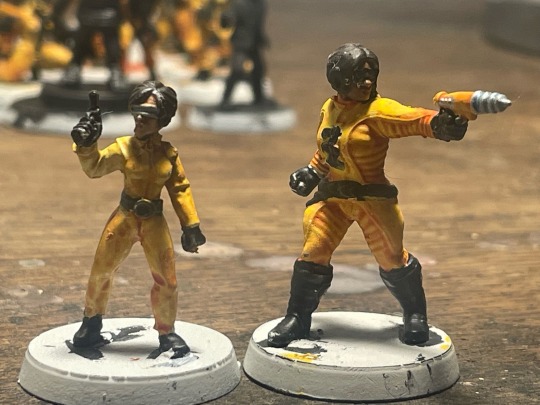
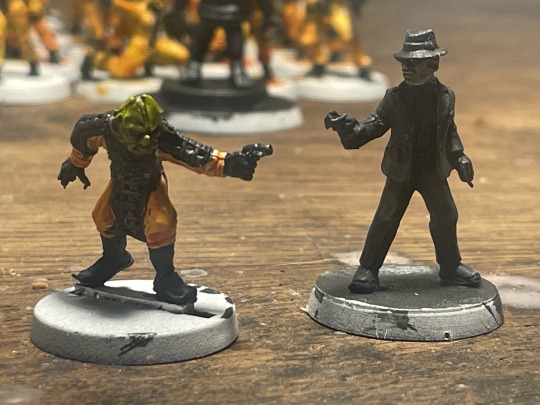
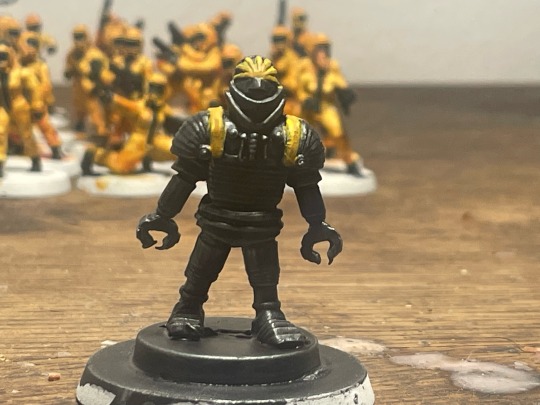
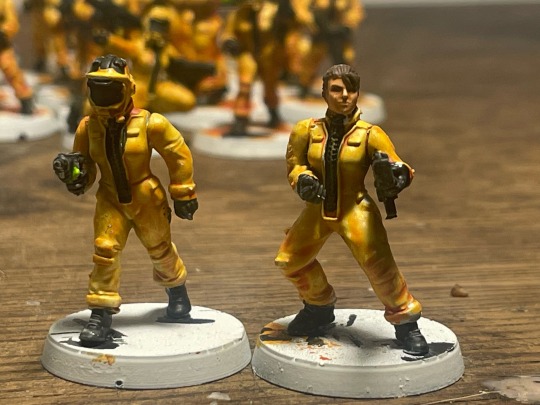
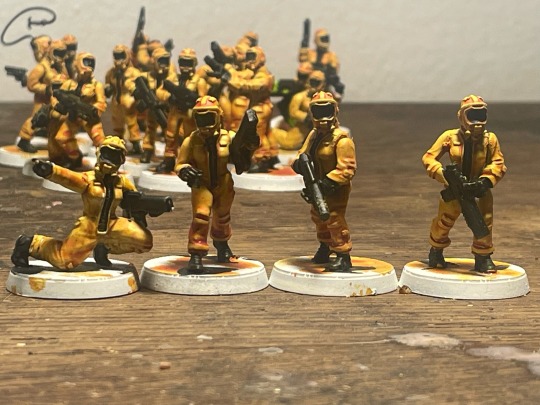
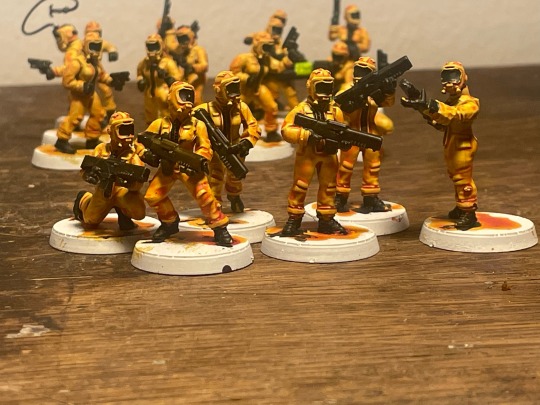
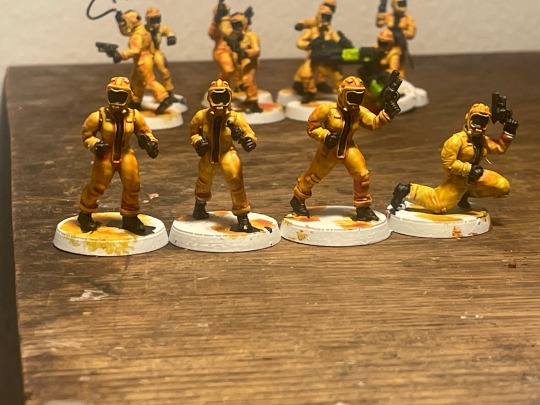
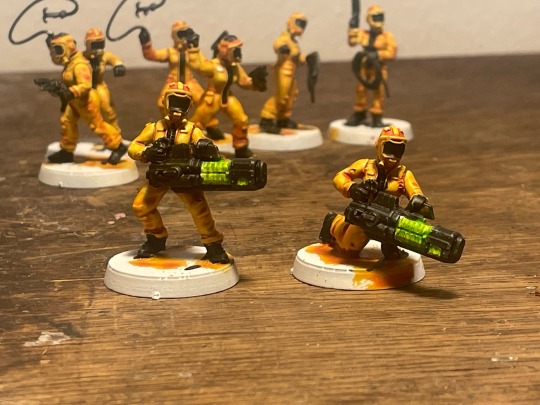
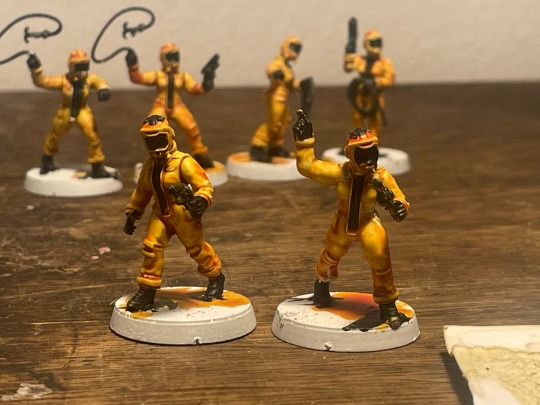
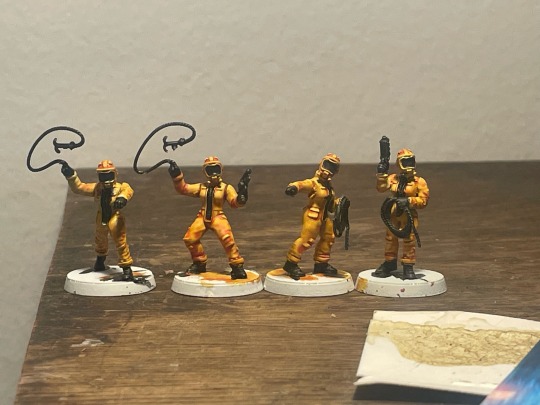
Not sure I’ve ever completed an army before. Interesting feeling.
Such a big project, I couldn’t fit em all in a good group shot.
#7TV#foundation paradox#spy fi#28mm scale#tabletop wargaming#miniature wargaming#miniature painting#jezebel enterprises#wargames atlantic#harlequin miniatures#black tree design#copplestone castings#statuesque miniatures#heroforge
20 notes
·
View notes
Text
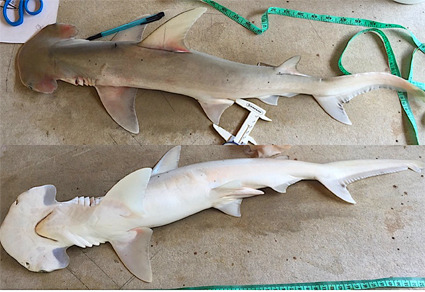
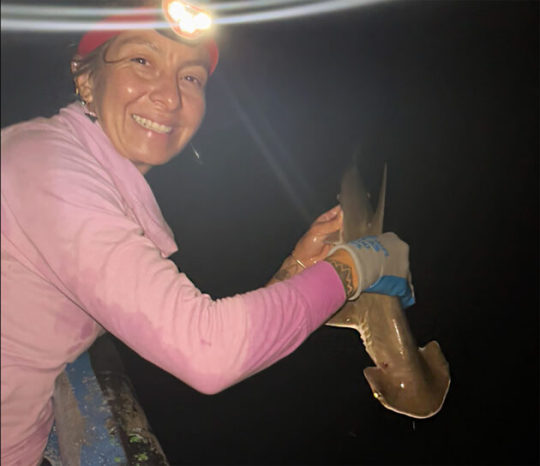
NEW HAMMERHEAD SHARK JUST DROPPED
Not every day does a new shark get discovered! Meet the Shovelbill Shark (Sphyrna alleni), a newly described species of hammerhead shark named after Microsoft co-founder and philanthropist Paul Allen. This new species is found in the coastal waters of the Caribbean and southwest Atlantic.
Hammerhead sharks are easily recognized by their laterally expanded and dorsoventrally compressed heads. Genetic studies have revealed that what was once thought to be a single bonnethead species (Sphyrna tiburo) is actually a complex, with Sphyrna alleni now recognized as a separate species. A longtime advocate for wildlife conservation, Paul Allen and his Paul G. Allen Family Foundation supported Global FinPrint, an international survey of the world’s reef sharks and rays. It was during this project that scientists conducted much of the fieldwork necessary to describe this newly recognized species. The Shovelbill Shark is smaller than the bonnethead, with distinct genetic and morphological characteristics, including a different number of vertebrae, which suggest it is separate from other hammerhead species. This new species is distributed from Belize to Southern Brazil, inhabiting estuaries, coral reefs, sandy and muddy bottom beds, seagrasses, and mangroves.

The Shovelbill Shark is a common component of artisanal fisheries in many Latin American countries and currently lacks proper management or protection. Previous reports indicate that this new species is undergoing overexploitation, making it imperative to safeguard their populations and establish fisheries regulations.
Photographs: Above is a male shovelhead shark (Sphyrna alleni), described from the Caribbean and the Southwest Atlantic. Below is Cindy Gonzalez, the lead researcher of the study, tagging the new species Sphyrna alleni (photo courtesy of the Mays Family Foundation).
Reference: Gonzales et al., 2024. Sphyrna alleni sp. nov., a new hammerhead shark (Carcharhiniformes, Sphyrnidae) from the Caribbean and the Southwest Atlantic. Zootaxa.
654 notes
·
View notes
Note
from a non-academic, i find parts of comphet to be useful (heterosexuality becomes compulsory when you’re raised in a heterosexual society) but the foundations . suck. what do we do with theories like this, that have touched on a truth but also carry a lot of garbage? can we separate the truth from the founder?
i have to be slightly pedantic and say that i don't think rich's essay is an example of this phenomenon. my central issue with her formulation is its bioessentialist assumptions about human sex and therefore also sexuality. if i say "capitalism includes economic mechanisms that enforce heterosexual behaviour and exclude other possibilities", then what i mean by "heterosexual" is plainly not the same as what rich means—and for this reason i would seldom formulate the statement this way, without clarifying that i am talking about the enforcement of heterosexuality as a part of the creation and defence of sex/gender categories themselves. so rich and i do not actually agree on the very fundamental premises of this paper! rich was not the first or only person to point out that economic mechanisms as well as resultant social norms enforce heterosexual pairings; i actually don't even think the essay does a very clear job of interrogating the relationship between labour, economy, and the creation of sex/gender; she means something different and essentialist to what i mean by sex and sexuality; and i think her proposed responses to the phenomenon she identifies as 'compulsory heterosexuality' are uninteresting because they mainly propose psychological answers to a problem arising from conditions of political economy. so, in regards to this specific paper, i am actually totally comfortable just saying that it's not a useful formulation, and i don't feel a need to rescue elements of it.
in general, i do know what you're talking about, and i think there's a false dichotomy here: as though we must either discard an idea entirely if it has elements we dislike, or we accept it on the condition that we can plausibly claim these elements and their author are irrelevant. these are not comprehensive options. instead, i would posit that every theory, hypothesis, or idea is laden with context, including values held and assumptions made by their progenitors. the point is not to find a mythical 'objective' truth unburdened by human bias or mistakes; this is impossible. instead, i think we need to take seriously the elements of an idea that we object to. why are they there? what sorts of assumptions or arguments motivate them, and are those actually separable from whatever we like in the idea? if so, can we be clear about which aspects of the theory are still useful or applicable, and where it is that the objectionable elements arise? and if we can identify these points, then what might we propose instead? this is all much more useful, imo, than either waiting for a perfect morally unimpeachable theory or trying to 'accept' a theory without grappling with its origins (political, social, intellectual).
a recent example that you might find interesting as a kind of case study is j lorand matory's book the fetish revisited, which argues that the 'fetish' concept in freud's and marx's work drew from their respective understandings of afro-atlantic gods. in other words, when marx said capitalists "fetishise" commodities or freud spoke about sexual "fetishism", they were each claiming that viewing an object as agentive, meaning-laden in itself (ie, devoid of the context of human meaning-making as a social and political activity) was comparable to 'primitive' and delusory religious practices.
matory's point here isn't that we should reject marx's entire contribution to political economy because he was racist, nor is it that we can somehow accept parts of what marx said by just excising any racist bits. rather, matory asks us to grapple seriously with the role that marx's anthropologically inflected racism plays in his ideas, and what limitations it imposes on them. why is it that marx could identify the commodity as being discursively abstracted and 'fetishised', but did not apply this understanding to other ideas and objects in a consistent way? and how is his understanding of this process of 'fetishisation' shaped by his beliefs about afro-atlantic peoples, and their 'intelligence' or civilisational achievements in comparison to northwestern europeans'? by this critique matory is able to nuance the fetish concept, and to argue that marx's formulation of it was both reductive and inconsistently applied (analogously to how freud viewed only some sexuality as 'fetishistic'). it is true in some sense that capital and the commodity are reified and abstracted in a manner comparable to the creation of a metaphysical entity, but what we get from matory is both a better, more nuanced understanding of this process of meaning-making (incl. a challenge to the racist idea of afro-atlantic gods as simply a result of inferior intelligence or cultural development), and the critical point that if this is fetishism, then we must understand a lot more human discourse and activity as hinging on fetishisation.
the answer of what we do with the shitty or poorly formulated parts of a theory won't always be the same, obviously; this is a dialogue we probably need to have (and then have again) every time we evaluate an idea or theory. but i hope this gives you some jumping-off points to consider, and an idea of what it might look like to grapple with ideas as things inherently shaped by people—and our biases and assumptions and failings—without assuming that means we can or should just discard them any time those failings show through. the point is not to waste time trying to find something objective, but to understand the subjective in its context and with its strengths and limitations, and then to decide from there what use we can or should make of it.
551 notes
·
View notes
Text
BARKING DOG | Jealousy + Price x GN!Reader
Jealousy comes easy for Price, but it's rare he ever acts on it. Until, of course, he does.
》 WORD COUNT: 4,9k 》 WARNINGS: None (don't look at me, i'm just as surprised as you are). 》 TAGS: Fluff. Angst. Coarse language. 》 NOTES: I've gotten a few asks (read: two) about my take on Jealous!Price, so this is that. —Jealousy would be rare in an established relationship. He sees jealousy as distrust, and since trust itself is the foremost foundation he'd want before even pursuing a relationship, it would be extremely out of character for him to give into it. —That being said, before you get together? When feelings are not yet Actualised? Ooof.
The heavy bass pulses through the unusually packed pub. The rhythm of it seems to reverberate through your body, harsh enough to rattle your bones like a second heartbeat in your marrow.
You can feel the re-echo of it through the worn herringbone floorboards, bleached in some parts by the repeated spills of ethanol, and the scuff of countless soles dragging across the wood. It pulses beneath you, alive with the leaden stomps of the pub-goers matching the rhythm of the band on stage—the very thing that drew the dense crowd into the ramshackle pub off the corner of Pilgrim and Rice Street.
It's nestled between Knowledge and Georgian Quarter, a place he'd said was quiet, but good.
Quiet, you think as cheers erupt when the band trails off their latest rock version of a Sea Shanty from somewhere in Atlantic Canada. If only.
It was clear when you arrived that Price hadn't anticipated the crowd. The placid look on his face crumbled into something sour, and surly, and you'd taken to jabbing your elbow into his side when he tried to turn around and flee.
"Who cares," you yelled, shrugging. "We're already here."
Who cares, indeed. You'd come to regret those words within a half hour of sitting in a booth in the farthest corner away from the makeshift stage you could find. The writhing mass of bodies heated the balmy room until the windows fogged over with a layer of thick condensation, and the air became humid, permeating the scent of people—sweat, the heavy admixing of perfume and cologne, rotten, waterlogged cigarettes and the lingering staleness of tobacco-saturated smoke, and rich ethanol from the abundance of alcohol sloshing against the raw floorboards.
It clots in your lungs until you're dizzy with its potency.
This was meant to be a way to unwind and relax. The mission had been a disaster—weeks of stress that you could only grieve about from your safe perch behind a desk—and you could tell when you met Price at the base in Hereford, the duffle bag, that was more his home than the flat he owned by the docks in Liverpool, slung loosely over his broad shoulder, that it was bad.
Terrible, even.
No lives were lost, but he carries the near-misses in the deep canyon between his brows and drapes each failure over his shoulder as if he was Atlas, cursed to carry it all.
There was a moment when he seemed to stagger, knees folding in under the neverending pressure that loomed over him, and it hardened something inside of you. The filaments of your tender joints were fitted with concrete, and as you hurried to his side, fingers looping around the strap of the duffle bag to try and alleviate some of his stress, it slipped out.
"Lemme buy you a drink."
Relax, you silently implored him. Let me help.
(Let me in.)
The unvoiced words lingered in the tense atmosphere that always seemed to bloom like a dense thundercloud around the two of you. It's one that starts when his eyes lift, meeting yours. It feels like a spark—like a rubber band being pulled tighter and tighter until the middle burned hot from the crystallising polymer molecules. Heat, white hot, settled in the thick space between your bodies, in the uncrossable impasse of your matched stare.
Sometimes, you almost convince yourself that he might shatter the opaque haze that clouds in the distance, that he might say something that will disperse the looming plume of separation. The uncrossable, crossed.
You're not oblivious to how he looks at you—listing across your flesh with nothing short of raw want in the pelagic gaze that brands you from afar. It's an aching sense of want that is so palpable you can feel the weight of his greed on your skin like a physical touch, like the steady hand he keeps notched into the space of your back, leading you steadily through the pandemonium of the battleground that is downtown Liverpool, or a crowded bar filled with rowdy adults.
An anchor. A guide. The solid ground beneath your feet amid the ever-changing plates that threaten to compromise your balance, sending you off the edge of a precipice.
Almost unconsciously, you lean forward, as if trying to meet him in the middle, to carve a perfect equilibrium between the asymmetrical chasm that sits, oppressive and unchartable, between the two of you.
It's then, always, when he seems to shake the reverie that overtakes him.
But he always takes a step forward before he steps back.
You consider that single moment of weakness more of a victory than anything else—pyrrhic as it might be, because when he notices he's now closer to you by his own design, carried by the slippage of his staunch control, the distance he pitches between you lasts longer than the winter months in the apex of a polar vortex.
He clears his throat, but his voice is still thick when he speaks. A rasping noise sticks, reluctantly, to the side of his throat.
"Right, mmm."
And then he'll say something that isn't quite goodbye but sounds like it all the same.
In a world of defensive pessimists, you've always tried to be an offensive optimist. Pushing, pushing, pushing until the bricks wobble and the walls crumble. Until you can see through the gaps to the other side.
But, in spite of it all, you get it.
If he wanted to, he would have. Simple. You know this. Echo is sharply like a mantra whenever he takes that single step closer, and the air in your lungs catches fire as you wait for the second—the one that never comes.
You push because you know you'll be good for him. It isn't the egotist in you refusing rejection, the optimist who refuses to yield, but before there was measured distance, purposeful silence, and accidental steps, there was friendship.
You were his friend first.
His confidant. The one he called after missions just to talk to someone who was firmly fixed on the ground of reality, but still tangled up in the world he spent most of his time in. You knew, then, that you'd be good for him.
And then Al Mazrah. Banter over the airwaves. An explosion. Radio silence for three days.
Everyone thought his group to be beyond saving—pieces scattered amongst the dunes, being picked at by the vultures and vermin; nothing to bring home, not even partially melted dog tags.
It was something greater than fear in those excruciating hours of nothing but the static in the airwaves. Nothing. Nothing—
And then—
"Lost my last fuckin' cigar—"
You had a job to do first. A role. You radioed in and pretended as if your lungs were collapsing in on themselves as if your heart hadn't torn out of your chest, and led to Al Mazrah to rot beside him in the scorching sun.
You managed (somehow, somehow) to forge some facsimile of normalcy into your voice even your fingers spasmed from being compressed into tight balls by your side, aching now as you tried to unfurl them. If your inflection gave anything away as you barked out coordinates to the rescue team, demanding a safe—and swift—extraction, it was only Price could ever pick it up.
Later, when the darkness around the edges of your splintering world started to recede, he called you. Nine hours on a jet to get to where you were. Two days in the scorching desert. And he still called.
It was the moment of fiction when the hero reached out to the sidelined love interest, that picturesque moment in film when the music rose to a deafening crescendo, and words of curated adoration slipped from the lips of the leading man. When the audience cheered with a sense of relief—fucking finally.
But it isn't fiction.
"Need a goddamn bottle of scotch after this one, love. Fuckin' hell, what a shitshow—"
It's reality. And Price.
It was in the aching nothingness when it clicked.
You might have been good for him, but that was in another life—when he wasn't already entangled in a sordid affair with his work, when even a brush with death and all its glory wasn't enough to change his mind. When the shakiness in your voice couldn't sway him.
And—
Sure. Okay.
You forced another wan smile that he couldn't see and offered to buy him a whole distillery as long as he came home.
"Might take you up on that."
And so, it was with the crushing absolution of rejection, and the firm friends-only label you slapped across the gaping hole in your chest to stem the bleeding, that you invited Atlas, with his sagging shoulders and trembling knees, out for a drink.
Eventually, of course, because he'd spent two days in the wilderness, in the unrepentant grip of the elements, and then another nine hours on a jet being fussed over by the medical team and getting only a blink of rest, and—
"Alrigh', but you're buying."
Eventually, of course, because he needed his rest.
But you've yet to meet another man nearly as stubborn as he is, and it didn't surprise you as much as you thought it would when he simply nodded, let you take his duffle bag, and followed you to his parked car. He drove, too, despite the fatigue around his eyes because you told him how much you despised the idiots on the Motorway near Heathrow, and he listened, of course, and said nothing at all when he pushed into the driver's seat, offering nothing more than a glance that said well? What are you waitin' for?
You didn't mean right now but maybe the brush with death softened him to your presence. Maybe, just maybe, he needs your company now just as much as you need his.
(Maybe, maybe—everything with Price has always been filled with maybes—)
Exhaustion clots in the corner of his eyes, deepening when he saw how crowded the pub was, but he still followed. Still went along with nothing more than a soft grunt.
So, here you are. Toasting to yourself about the quiet rejection he gave, and weaving through the throng of bodies, two glasses clenched in your sweat-slicked palms, as you try to get his promised drink back to him.
It doesn't hurt as much as you thought it would.
(And other lies you tell yourself—)
That might have more to do with the absence of anything living inside the rotting hole where your heart once beat. A gap, now, as that pesky little nuisance has fled the confines of its fleshy prison for the scorching heat in the desert to remain, forever, beside whatever it was that Price left behind when they found him.
(—at least they're together—)
The amber in the glass sloshes when someone backs up, clipping your shoulder. Droplets spill over the rim, running down your fingers clutching the drink. It's cold despite the heat that permeates the crowded pub. A sharp contrast that makes you shiver.
The nameless, faceless entity whirls around when you stop, stabilising the drinks in your hand, and you catch wide eyes in your periphery, a mouth moving but the words are swallowed by the vacuum of noise booming from the patrons, the speakers.
"...shit," you vaguely make out. "I'm so—shit—I'm so sorry, did I spill your—ah, fuck, let me get you a napkin—"
He's cute, you note. Boyishly handsome with his thick, dark curls and soft almond eyes. The warm glow of the strung lanterns overhead cast a halo of pale orange and muted yellows on his flushed skin, making him look like a bronze-dusted cherub in hazy, ethereal gold.
Handsome, like the men on the covers of Vogue.
His eyes are dark—bewitching—and when they crease with shame, and contrition, you find yourself conjuring the image of a guilty golden retriever, head bowed in consternation but tail still sweeping low.
The comparison makes you huff.
"I'm alright," you say, more for his benefit than your own.
He turns at the sound—startling as if you, too, were a nameless, faceless stranger in the middle of everything— and you catch the sharpness in his features when he looks back at you. Beneath the boyish veneer are chiselled cheekbones, full lips, and a divot in his chin. Perfectly symmetrical in his beauty. His eyebrows are groomed, but thick. Black against raw topaz.
(You've always loved uncut gems.)
"Hi," he murmurs, eyes darkening as he takes you in. "I, uh—sorry, I wasn't paying attention."
But he's paying attention now. There's a cut of appreciation, intrigue, in his eyes when they trail over the features of your face. Differentiating you as an individual person amid a sea of so many.
"You, uh—" he blinks, and then his mouth peels open in a grin that's just as charming as his boyish features. It's soft, if a little windswept. "Hey."
It isn't the smoothest transition from nervous fretting to something that seems like it's meant to be suave, but it's endearing in an inelegant way. it feels unpolished. Authentic. Like the word slipped out of its own accord.
Stunned. You stunned him.
"Hey," you echo, offering a small smile of your own.
And it's a bad idea. One that dips in an almost tangible glimmer of hindsight, like some portent proclaiming an inevitable regret when your senses clear, and the ache in your stomach fades into a sore knot that you can ignore on a good day.
But he's cute. Charming in his clumsy attempts to make sure you're okay. He isn't something that can fix the ache in your chest, but he's certainly a balm to it. A temporal crutch. One you think you can live with.
"Are you from around here?" He has a soft voice—low, dulcet. Plummy, but not gratingly so. Refined, you think. There's a soft elegance to him, and in the way he moves, speaks.
The balm spreads as his head tips to the side when you tell him where you're from, curls bouncing freely against his cheek.
"Oh," he notes, his lips falling together to make a pretty, pink circle. Adorable. "That's far. Come to see the show? My mates and I came out to see them. They're kind of a big deal where we're from, and—"
Someone pushes through the gap behind him, pushing him forward. You reach out, but the glass in your hands stops you from doing much when he stumbles, losing his footing from the sudden shove, soles of his oxfords (of course, of course, he's wearing oxfords) catching on the spilled drink from earlier.
Blearily, you have a moment to admire witnessing the sequence of events come full circle before his hands reach out, scrambling for purchase, and fit across your shoulders like he's searching for a climbing hold to catch himself from the fall. You tetter back from the brunt force of him stumbling into you, before catching yourself on the pillar cutting through the room.
He's muttering apologies as he straightens himself out, but your eyes are drawn to the rivulets of scotch dripping down the back of your hand. Three fingers dwindling quickly down to one.
"I'm—shit—I'm so sorry—!"
He looks cute frazzled like this. His coiffed curls tangle across his sweat-slicked forehead, dangling over his dark eyes. There's a flush growing across the bridge of his nose, colouring him in a distinct palette of rose, bronze, and gold.
You've always been partial to blues and browns, but this wedges inside of you—different, but not overly so.
"What a jerk—" you lift your chin, glaring over the top of his tousled curls.
"Yeah," he breathes, the word nearly eclipsed by the pounding in the background.
His hands are still on you. When you turn back to him, you're almost a little surprised by how close he is. A short step, and suddenly you realise that it wouldn't take much for you to lean up, and kiss him.
It's an odd, aching contrast to the one step forward, nine steps back with Price.
You think about it. About kissing him. About going back to the booth in the back where Price is waiting, and demanding he rejects you already so you can pull yourself out of the limbo you've fallen into, run your fingers through this man's hair, and feel nothing at all except satisfaction.
(Instead of guilt. The stifling sense of betrayal.)
You tilt forward as if trying to meet him somewhere in the middle. As if a kiss would break this skein web where you can still, somehow somehow, feel Price's presence around you like a nebulous cloud. A magnetic pull that keeps some facet of your attention on him, always.
Still. Still.
The tether is short. You stop before you close the minuscule gap, and let your body fall back on your heels.
"You know—" You start, but the words—one with no real objective outside of salvaging something from this mess—are swallowed by a call.
He startles a little at the noise, craning his chin over his neck to see what is vying for his attention. You follow the breadcrumbs of his gaze, locking onto a man waving his hand over his head.
"Ah," he says. He knows him. Obviously. He turns back to you, something sheepish flickering across his keen expression. Reluctance settles in the crease of his eyes. He huffs. "I, uh, guess I should get back to them."
You nod. "Sure. Enjoying the riveting show, right?"
"What can I say?" He grins, wide and bright. "I'm a sea shanty kinda guy, and they've been gearing up toward Stan Rogers all night."
"Wouldn't want to miss that."
"No," he shakes his head. "You really wouldn't. But, uh—"
You know what he's going to ask for before the words are out, and you give it to him.
Your name. Your number. His hands fly to his pocket, hastily pulling out his phone, and tapping the numbers into his contact screen.
"I do owe you a drink," he jokes, eyes skirting to the lonely swallow in a glass meant for another man. "So, uh, if you ever want to cash in on it tonight, um. Text me?"
It tapers off into a question, and the vulnerability, the softness of him, blooms something warm in your chest. He won't just be a balm, you think, but a bandage.
Your smile is loose, even. It's the first one in weeks since the radio was cut and your world was thrown into a staticky silence. A communications blackout.
"I could buy it for you now if you'd like…"
It's sweet. He's sweet. Different from the men you're surrounded by—ones with hard edges, and brittle trauma.
"I think you should get back to your friends," you say instead. "But I'm sure I'll see you around."
You want to feel selfish, but you don't. There is nothing between you and Price but a tenuous thread he tries to pull as taut as he can, and the chiaroscuro that paints him and this man are like night and day; normalcy and—
Well. Price.
He gives you a slow nod and then slips his phone back in his pocket. He doesn't even try to call the number you gave him, so trusting that everything you said was the truth. Your phone is back on the table where you left it, but you're sure it buzzed with his text.
"I'll see you around."
He waves you off with a two-fingered salute against his temple and turns back to his friends when the moment passes. Without soft brown pinning you against the pillar, and spilling comfort into the aether, the world around you snaps like a rubber band to your skin.
Something shakes loose inside of you, and you turn on your heel, balancing unequal glasses of scotch in your hand. When you lift your head, seeking out the booth, you meet noctilucent eyes boring into yours.
The tether wobbles. The noise fades into a whisper drifting through the pews in an empty church.
Right.
You forgot what it felt like to truly be pinned in place by blue.
The noise floods in a strange, distorted echo the closer you get to the table.
"New friend of yours?" He asks, expression clouded with impassivity honed before you even knew what the threads of apathy felt like beneath your fingers.
His eyes drop to the glasses, curving along the knob of your wrist when you push the fuller glass toward him. Derision blooms, splicing through cerulean-tinged disinterest.
You wonder how much he saw, and—with a bitter touch of trepidation—if he kept watching.
It's answered when he scoffs. "Couldn't even buy you a new one, eh?"
"It's only a little off the top."
"A little, hmm?" Bruised knuckles, split and cracked at the crease of his bone, curl around the glass leaving a smear of tobacco stains behind. "Your phone rang earlier."
It sounds testy. Cross. It makes you bristle like a cornered cat.
"I know. He texted me his number so I can find him later."
"That so?"
Your nod is short. Clipped.
Price leans back in his seat as you slide into the bench across from him. His gaze never wavers. It never does. You feel it like a warm hand against your throat, and the thought alone makes you swallow hard, and breathe harder.
"If that's what you want—a clumsy fuck next in an alley with a man who doesn't know how to really please you, then by all means, love. Go for it."
His words are scraped out of his throat by the fine edge of a scalpel; grizzled and raw, and drenched in the heavy ethanol of his scotch.
He normally sounds like this after a mission, after he stood in the middle of a bloodsoaked battlefield, and bellowed out harsh commands until his vocal cords swelled up, and split apart at the seams.
When he speaks, you scent the coagulated blood of the pulsing wound, ripped open by the scotch and irritated by the cigar clenched tight between his thumb and forefinger.
"But when you get tired of quick fumbles with an idiot who only cares about himself, I'll be waiting. Just don't keep me too long, love. Ain't gettin' any younger."
His words are meant to cut. To slice through flesh, and saw into bone.
"Neither am I—" Those icy eyes meet yours. You shiver. "You—I mean, honestly, Price; I've been putting out pretty clear signals since the beginning, and—"
"I know."
And—
Oh.
"Great." You say. "Good." But it isn't. It hurts like a knife to the gut, serrated edge tearing through soft tissue. A blunt pressure against your sternum until it bruises, and then cracks.
(You always knew he'd be brutal in his rejection.)
You're a distraction, is the underlying accusation to everything. Unneeded. Unwanted.
But something splinters in his glacial gaze; a frisson that splits into a crevasse, a chasm. Darker than midnight, and endlessly wanting. Harsh winds billow from the moonlit depths, howling against the icy walls.
"Good?" He echoes, tone gritty and unrefined. A jagged gem with sides sharp enough to cut. "Don't think you understand what you're startin', love."
It's not anger that clots between his teeth, that colours the divots in his brow harshly turbid, but you feel the blistering heat leaking from his skin all the time.
"And what am I starting, Price?"
There's picking at wounds sealed over with a scab, and then there's reaching into the pyre with both hands just to cauterise a paper cut.
This, you think, when he shifts in his seat, eyes narrowing at you, is that. The latter.
You smell burning flesh and feel the heat scorching your palms when he moves forward. There is nowhere for him to go, but he wouldn't be Price—indomitable Captain John Price who still threatens his superiors after almost dying in the desert because they want him to take a mandatory leave—if he didn't make room, didn't force his way through.
He leans over the small, three-plank table that divides you, and roughly grounds your name out between nicotine-stained teeth. It's a warning, of course. A rotting barbed wire fence that says keep out, no trespassing. But beneath it, you hear a plea.
Please don't come any closer.
It occurs to you, then, when his eyes grow lidded and heavy, weary. When they clove with uncertainty, and a brittle vulnerability that seems out of place across the staunch, hardened veneer of a man who finds screaming through a fusillade easier than taking a step forward.
You get it. It isn't mocking scorn or brutal, vindictive words. It isn't him mercilessly picking apart the soft, gentle exchange of a man you'd willingly given your number to. It's—
"Too much," he says, and the tether sways.
—basal. Naked jealousy.
He seems to gaze inward for a moment after his confessional fades, and the sounds of pulsing bass, jaunty music, and rhythm thuds against the floorboards flood the space eked out with his voice. It's a brief flicker. And then the mask is pulled back on.
One step forward. One done almost unconsciously.
But it tugs on the line connecting you both, and so:
You take that step instead.
Meet him in the middle. Connected by one end of a short line. It drops loose against the table, tangling in the spilled drinks that have come before you. Top sticky, scoured raw with ethanol, but still attached. A tether, a red string of fate. You're locked, somehow, in his pull. An orbital eccentricity: forever circling a sun that threatens to burn you whole when your alignment gets too close.
There's hesitancy in the angles of his face, casting shadows of uncertainty in the murk. Always pulling back. Always only one step in.
You might have, too, if you didn't see the brief flicker of midnight blue dropping to your mouth. The flash of greed—dark want; covetous florentine—as he gazed at you.
You know John. A man who gives, gives, gives, but seldom ever takes. Content, you think, with just this unignorable strand arching between the chasm of your hearts.
(But you've always taken more than your hands can carry.)
So, you chisel a space in that glorious want, shape in until it fits you perfectly, and press your lips to kiss in a truculent kiss, braced for the recoil.
But he doesn't.
It feels natural when he rasps your name out between lax teeth.
Feels, you find, even better when you slot your mouth against his, gently this time. Peppering a litany of devotion across bristly lips that feel more comfortable spitting vitriol than sweet nothings.
"Been waiting a long time, John."
Against your lips, he groans. "Guess I better start makin' it up to you."
"Guess so."
His eyes flash, then, aposematic; burning bright in a pretty circle. The rich colour reminds you of a blue-ringed octopus.
Captivating, vibrant, electric.
His chin tilts toward the stage, hypnotic, iridescent blue pulling away from you to follow the list of his head. You know when his brows furrow, a deep canyon of displeasure and sullen irritation, that he's staring at the man who gave you his number. His lids fall, eyes narrowing into a tight slit.
Deadly, dangerous.
Tetrodotoxin taints pretty cerulean in a shade of inky black.
You reach out, eyes never straying from Price, and curl your fingers around the thick bulk of his tensed wrist.
"Wanna get out of here?"
He doesn't look away from the man. You don't look away from him.
"Yeah," he grumbles, but the gloss in his gaze reeks of victory. "Let's go."

"Thought you'd make me wait forever."
He hums, considering your words. The streets are lively despite the late hour, reeking of ozone and malt. A kaleidoscope of colours spills out from the cluster of shops, drenching the gunmetal cobblestone in a varicoloured smear.
"Might'a," he agrees, tone light and cooler than the breeze.
"I guess it's a good thing I got bumped into. Without your jealousy, this might've gone nowhere."
He stills suddenly, body tensing like a coiled cobra.
"John—?"
You get a glimpse of prowess when his hand snakes out, snagging your shoulder, and before you can even pry apart your teeth, he moves you in three quick steps, pushing your back against the dewy wall.
His hands are hot on your collar, your waist, and he holds you firm to the brick. But the heat of his palm is a mere ember compared to the blaze in his eyes—lavascapes in midnight blue.
It leaks down, molten puddles, before it congeals around the soles of your feet, keeping against brick, and under the weight of his stare.
His gaze sharpens when you settle in his hold. "And that guy?"
You smile in a facsimile of placating condescension as his hands tighten around you. "Which one?"
He lifts his hand from your shoulder, dragging his bare knuckles over your dewy skin, letting himself feel the flutter of your pulse under burning flesh. They're rough, split and scared, and you want to take them into your mouth. To taste the ichor rushing through his veins.
They're dragged up, away from your parting lips, and you nearly pout from the loss before his fingers brush over your nape, where they curl around your neck, holding you close as he growls out your name, breath ghosting over your lips.
"None, love. Won't want any by the time I'm done with you."
"And when are you gonna be done with me?"
"Never," he murmurs, fingers tightening over your nape. "Kept thinkin' 'bout you the whole time I was in the desert. Dyin', and my only thought was fuckin' hell. I've been a goddamn idiot."
Price takes a step closer to you, and your blood burns. One forward, and—
He takes another. Another.
He kisses you, then, like he's trying to devour you whole; trying to carve a place inside of you just for him. A space inside each other where nothing else can fit.
A rogue planet, a stellar collision.
Every atom inside of you burns bright blue, and you find purchase on his broad shoulders—Atlas carrying the world, and you.
#captain price x reader#john price x reader#captain john price x reader#john price#captain john price#i am once again sick (sobs) and so#this was not edited#none of my fics are tbh#but i left this one in gods hands#if anyone needs me i'll be weeping in bed and playing far cry 5#gn!reader x price#gn reader
1K notes
·
View notes
Text
POKEMON EVIL TEAMS RANKED BY HOW LIKELY I WOULD BE TO JOIN THEM
Team Flare
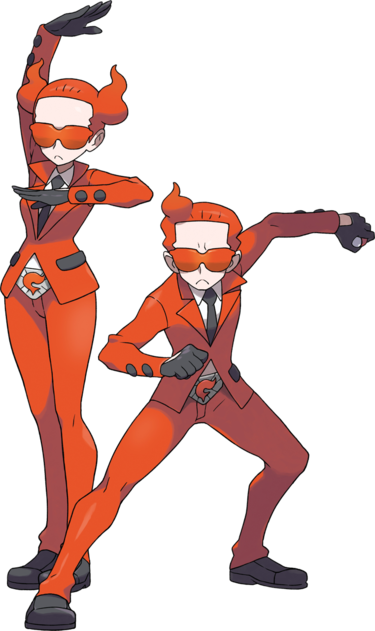
I'm not wearing that suit and I'm not changing my hair. Lysandre is easily the fucking dumbest antagonist and if their plan is successful either they're immortal and I have to live with these losers forever or the whole world dies and I have to live with these losers until I die.
Team Yell
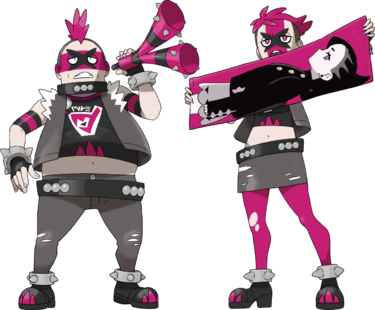
This entire team is centered around having a parasocial relationship with a teenage girl. Also British.
Team Galactic
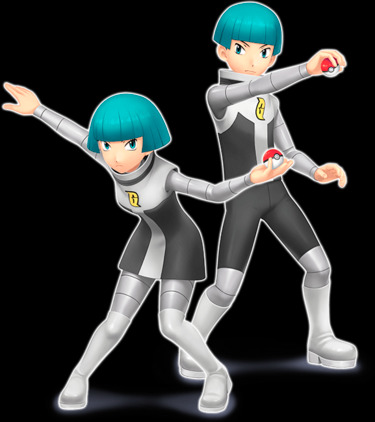
Similar horrible haircut, bad outfit, and death cult scenario to Team Flare. At least they're like a semi-actual company. I could maybe just go bald and get a regular job after the Poke-government liquidates Team Galactic LLC. But I legitimately think this would be the least fun evil company to work at. Imagine stealing some kids Pokemon but you get chewed out by fucking Galactic Admin Uranus because you forgot to fill out the Paperwork.
The Lame Part of Team Plasma
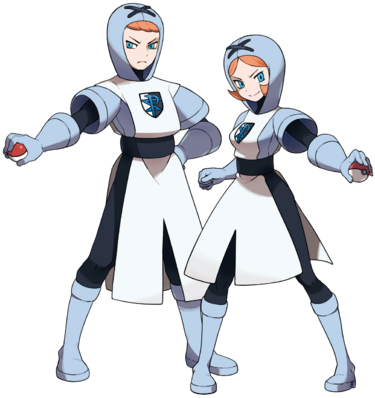
Okay so to clarify these are the people that actually believe in the Team Plasma shit, which means I'd probably be spit on in the streets while wearing chainmail in New York. Why the fuck would I wear Chain Mail on the East Coast? Do you know how much rust there is? Also I have to become a ginger and worship some green manchild as a monarch. At least they're not a death cult.
Team Rocket
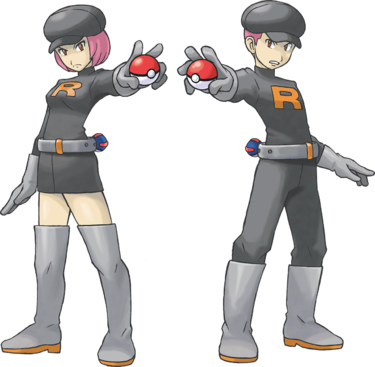
This one is just being a criminal. Like, yeah, you get to steal Pokemon but there's no real advantages except the free gray boots. Probably does not pay well and Giovanni leaving kind of sent them spiraling. Plus they have a lot of Koffings in an underground base so you know there's like lung damage galore. The R stands for Respiratory Distress.
Team Aqua
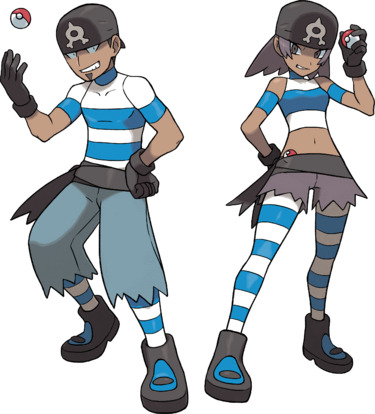
I don't like the idea of being surrounded by the ocean and I do not like boats and submarines. I would actively join this to sabotage their plan. Also every other evil team has an actual place to put their Pokeballs but this one it seems like the plan is to just shove it in my underwear? ???
Team Star

I haven't actually played Scarlet and Violet because I recently learned I can legally drink. I think this one is the equivalent of a school club? So I'm not actually getting paid to do evil shit. I'd probably just join, like, DnD club or something.
Team Rainbow Rocket

I'd join this one just because I know it's going to fail. I mean, it's got like four people who explicitly just want to end the world in different ways. I'm just gonna join and steal pens and shit until it eventually crashes in on itself for infighting. I'd wear my gay-ass R shirt every june in line with a P, I, D, and E.
The Cool Part of Team Plasma
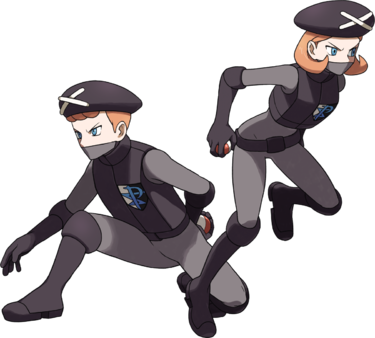
Fuck yeah. This is the Team Plasma that knows the shit Ghetsis is up to. I'd love to be in on the scheme, plus I don't have to wear chainmail. Downside is I'd probably get murdered or have to murder to stay in, and they have the biggest shot of accomplishing their goal. But Ghetsis is hot so that's a plus.
Team Magma
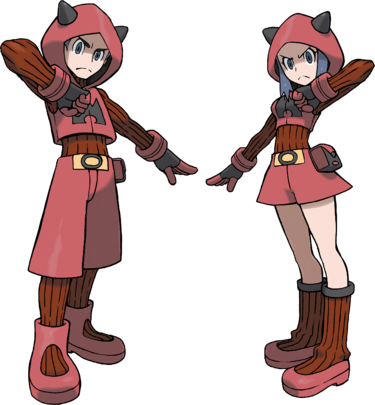
This one is because there's 0.0% chance this plan will work but I get to just hang out in these cute-ass hoodies and pet camerupts all day. Look at that outfit, I'd wear that all the time. That being said, would probably have to be a field guy. Their location is in a volcano. I'm gonna get a call that says 'Hey all of Team Magma's leadership died' and I'd have to get a job at like Poke7-11 with a major gap in my resume.
Macro Cosmos
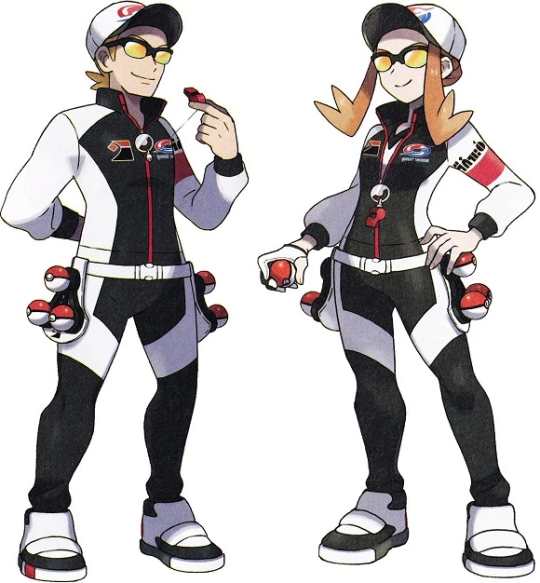
This hardly counts as a villain team because they're just, like, security guards for a company whose CEO goes a lil nuts. This is like if you worked for Virgin Atlantic and Richard Branson decided to summon Satan. No one can really put that on you. You'd probably get paid ridiculous amounts of money for essentially doing nothing. Con is you'd have to live in Galar.
Aether Foundation
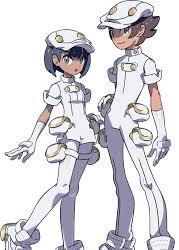
Working for the Aether Foundation is like doing an internship at Bell Labs or whatever. The evil shit is probably fixed by the end of the game and I could just go back to researching Rotom electromagnetic applications and have that 'week where we tried to fuck up reality' be a weird company thing we brush under the rug. The con is they have all white outfits so I can't eat spaghetti at work. But even if I left I could probably just use Aether Foundation as a decent enough jumping off point for any career.
Team Skull

Genuinely this is just goofing off with a bunch of scummy weirdos. I can respect that and their outfits are thankfully not skin-tight jumpsuits, but main I'd join because they all kind of suck. With the most moderate competency I could run Team Skull. Also Guzma. He's pretty hot.
#text post#pokemon#team rocket#team skull#team galactic#team plasma#team magma#team aqua#team flare#team rainbow rocket#i forgot someone but idc
102 notes
·
View notes
Text

The conflict over Columbia U's Gaza Solidarity Encampment pits an Egyptian-born school president against a student movement largely led by Arabs and Muslims protesting Israel's genocide in the besieged Gaza Strip. Goaded by Republican members of Congress and the Israel lobby, Columbia President Manouche Shafik has sicced the NYPD on the protesters, triggering mass arrests and suspensions of students for supposedly "trespassing" on their own campus.
Like so many contemporary Ivy League presidents, Shafik is not a scholar or academic. She currently serves on the board of the Bill and Melinda Gates Foundation, providing a patina of diversity to a supranational global governing entity guided by a single uber-billionaire. Prior to that, Shafik acted as deputy governor of the Bank of England, the UK bank that confiscated Venezuela's gold reserves under orders from the US government in 2019. She has also served in top roles at the IMF and World Bank, where global south debt becomes a point of leverage for Washington and London. Her own journey to the US began as a young child when Egypt's populist President Gamal Abdel-Nasser seized land from her wealthy father.
Shafik owes her entire career to the trans-Atlantic oligarchy, and has no space in which to defy it. She was not appointed as president of Columbia to instill values like critical thinking or academic freedom. She's there to raise hundreds of millions from her wealthy benefactors. Her leadership not only exemplifies the elite corruption of US universities, it exposes the sham of neoliberal diversity politics.
243 notes
·
View notes